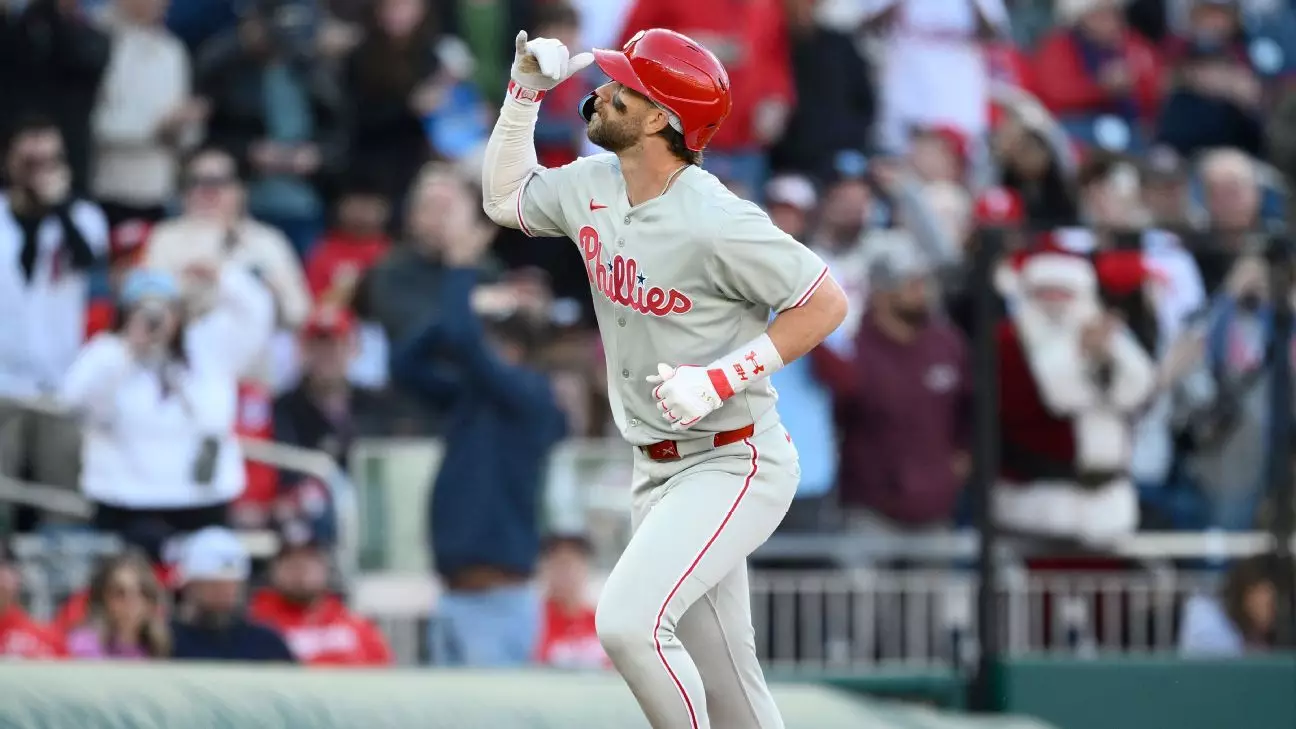As Major League Baseball kicked off another thrilling season, the atmosphere at Nationals Park was laced with electric tension. Yet, amid the anticipation, there was a palpable undercurrent of hostility directed at one man—Bryce Harper, the former face of the Washington Nationals. Thursday’s Opening Day was not just another game; it was a veritable crucible for Harper, who returned to the park that had once embraced him, but now jeered him mercilessly. The jeers were not merely reflections of a fanbase scorned; they embodied the complexities of loyalty and betrayal in the world of sports.
Harper’s narrative is far from conventional. He rose through the ranks, shining bright as the 2012 National League Rookie of the Year and ultimately taking home the 2015 NL MVP award. Leaving Washington for Philadelphia in 2018, Harper triggered a myriad of emotions—elation for the Phillies and a deep sense of loss and resentment for Nationals fans. As he stepped into the batter’s box in the top of the first inning, it was clear that Harper had become a symbol of divided allegiance.
Facing the Music
The symphony of boos that greeted him was an echo of a fractured relationship. Fans screamed, jeered, and made their discontent crystal clear. But rather than retract into himself, Harper used this negativity to fuel his performance. “I love coming in here and playing in this stadium,” he declared amidst the hostility, framing the animosity as an inseparable part of his journey. His remarks about maintaining relationships with the employees at Nationals Park highlighted a sense of nostalgia and grace amid contention.
Harper’s ability to navigate this turbulent atmosphere speaks volumes about his character. Some might confuse his resilience with apathy, but that couldn’t be further from the truth. Home runs and accolades aside, it’s Harper’s mindset that sets him apart. He embodies a duality; he is both the hero and the villain, the celebrated player and the scorned local boy.
The Moment of Glory
Then came the defining moment—a pitch, a swing, and suddenly, the ball was soaring into the deepest part of the park. In a blink, Harper had transformed hostile energy into a cathartic release for his team, the Philadelphia Phillies. His booming home run in the seventh inning ignited a floundering lineup and shifted the momentum of the game, with the Phillies eventually clinching a 7-3 victory after a back-and-forth struggle that went to extra innings.
This wasn’t just a hit; this was a statement. Harper’s words rang clear: “Obviously we don’t want to punch out 19 times… but today, made it happen, made it work.” As he noted the team’s staggering 19 strikeouts, there was no sugarcoating the difficulties, but his swing signified hope and tenacity. It was as though he transformed frustration into a stunning display of talent and determination.
A Journey Still Unfolding
The dynamics of Harper’s relationship with Washington fans are layered and complicated. His acknowledgment of the workers at Nationals Park who still appreciate him—despite the hostility from the stands—reveals the complexities in sports loyalties. The emotional tapestry of being both loved and loathed illustrates the paradox of athletes today: they are public figures navigating through personal journeys and their relationship with fans is one of the most potent narratives in sports.
As the season unfolds, Harper’s performance will continue to remain a focal point, a microcosm of broader themes in professional athletics—it’s not just about the games won or lost, but the stories they create, the rivalries that ignite, and the enduring spirit that every player brings to the field. Bryce Harper’s journey is ongoing, and his subsequent games will only deepen our understanding of his role—in Philadelphia, in D.C., and in the pantheon of baseball greats.


Leave a Reply